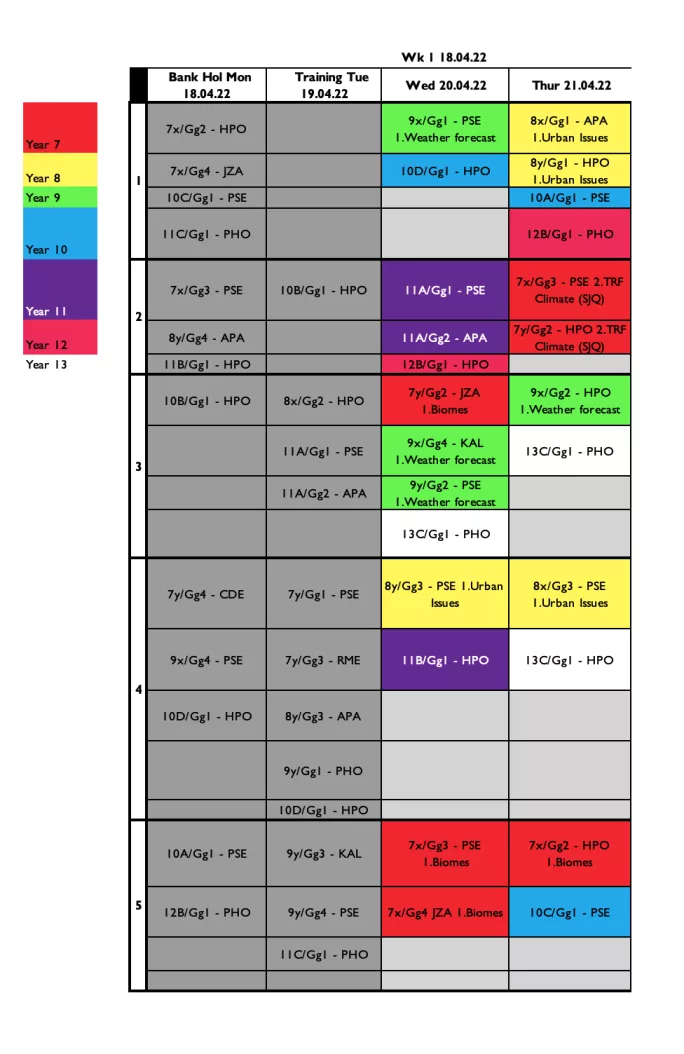A few years ago, when one of my teachers was signed off on long-term sickness, I knew I needed to get organised to ensure students still experienced high-quality geography lessons from any member of staff teaching them.
I created a department “master plan” - and in the past few years, I’ve been so grateful that I did. As staff absences increased due to Covid, we have been able to provide high-quality cover quickly and efficiently.
So, what does the master plan look like?
It’s worth highlighting that our key stage 3 curriculum is planned centrally: each year group is delegated to a specialist member of the geography team, and all the KS3 lesson resources are placed on our network to share with all geography staff, including non-specialists.
GCSE and A levels are planned slightly differently, staff are provided with “starting point” resources, which are shared on our school network for all geography staff to use and adapt.
All staff are encouraged to adapt the resources to suit their classes, and then share those back with the team. This means everyone is teaching the same lesson titles from the same scheme of learning - which is essential to the success of the master plan.
The organisation starts at the beginning of each half term: I take the entire geography timetable, download it into an Excel spreadsheet and fill it out with staff initials, the class name and the lesson title. The lesson title, here, is the crucial bit. This allows me to have oversight of the entire curriculum across all year groups and ensures teachers are teaching the right topics in the right order.
It sounds simple enough, but it’s important to give it your full attention. If you miss a lesson, it can be confusing for teachers. I start the master plan process with Year 7, have a break and then do the next year, and so on - this ensures I spot mistakes and can alter them before it’s shared.
Once it’s complete, I email it to all geography staff and place it on our sharing platform.
It’s an invaluable tool: it means that I know exactly what topic is being covered by each class in each lesson. If someone calls in sick, I know exactly which resources to pass on to whoever is covering that lesson, without having to bother the member of staff who is off.
This has done wonders for wellbeing: teachers can concentrate on resting and getting better, rather than worrying about their lessons.
Since I first started this master plan, I have added in when homework will be set, when assessments will be carried out and when feedback slots are. This makes book looks and lesson walks a lot easier as everyone is doing the same thing.
The approach has faced some challenges. At first, I had to remind staff to look at the plan, rather than asking me what the next lesson was, but after a short meeting on it and a reminder, staff were on board.
I also had some teething issues with teachers not following the plan: and sometimes, when I went to deliver the lessons planned, the students had already done it. I followed up with a conversation with the staff member about what happened. Often, it was because they’d finished the lesson early, and so moved on to content in the next; where this happened, we adapted the lesson and added more tasks.
Now, all the staff know that they must follow the plan, and if they find problems, speak to me about them before the lesson.
Today, I would be lost without our master plan, as would my staff. And the success has been recognised across the school: other teachers have approached me about the master plan when going for head of department interviews, and are always determined to take the idea forward in their own department.
Creating a master plan takes a bit of time. But I can confidently say that it will be time well spent.
Hannah Potter is the lead teacher of geography at Bedford Academy in Bedford






